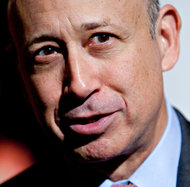 Spencer Platt/Getty ImagesWall Street banks have been buffeted by the weak American economy and the European debt crisis.
Spencer Platt/Getty ImagesWall Street banks have been buffeted by the weak American economy and the European debt crisis.
For most Wall Street bankers, 2011 was a year they would rather forget. Investors will soon find out just how bad that year was for the country’s biggest financial institutions.
In recent days, analysts have been lowering their fourth-quarter earnings estimates for Goldman Sachs, Morgan Stanley, Citigroup and Bank of America. Analysts are also bracing for lower earnings from JPMorgan Chase, which on Friday will be the first of the Wall Street banks to report results.
“It’s likely 2011 will be the worst year for revenue growth for the banks since 1938, and so far 2012 isn’t feeling much better,” said Michael Mayo, an analyst with Crédit Agricole Securities and the author of the recently published book “Exile on Wall Street: One Analyst’s Fight to Save the Big Banks from Themselves.” “The industry simply grew too fast over the past two decades and now it’s downshifting. This process will take time, but the hit to revenue is happening now.”
Wall Street banks have been buffeted by a weak economy in the United States and by concerns that the European debt crisis will spread, sending shock waves through the financial system.
At the same time, most banks are expected to book an accounting loss in the fourth quarter from the performance of their own debt. In the previous quarter, this one-time item significantly bolstered the earnings of a number of banks.
With business sluggish, Wall Street banks have been chopping staff and expenses. A dismal 2011 will translate into smaller employee bonuses, which most banks will begin handing out in the coming weeks. Compensation experts are estimating compensation for Wall Street employees could fall as much as 30 percent from levels a year ago. While sharply lower bonuses may be politically popular, they will also eat into the revenue that New York State collects from Wall Street.
 Daniel Acker/Bloomberg NewsLloyd C. Blankfein, chief executive of Goldman Sachs, which had a drop in client trading revenue.
Daniel Acker/Bloomberg NewsLloyd C. Blankfein, chief executive of Goldman Sachs, which had a drop in client trading revenue.
The challenges facing Wall Street are illustrated by the performance of Goldman Sachs — for years the envy of rivals for its ability to churn out rich profits even in rough times — in recent quarters. In the third quarter, Goldman reported a loss of $428 million, in contrast to a $1.74 billion profit a year ago. Goldman’s chief executive, Lloyd C. Blankfein, told investors that Goldman was “disappointed” in the performance.
For the fourth quarter, the firm is projected to post a profit of $2.02 a share, according to a survey of analysts by Thomson Reuters. That consensus number is down from $2.81 a month ago. And it is likely to fall further in the coming days as more analysts weigh in with new estimates. Some analysts already have Goldman, which reports on Jan. 18, earning less than $1 a share in the fourth quarter.
New regulations combined with a drop in client trading revenue and the falling value of some of its core equity holdings, like the Industrial and Commercial Bank of China, a strategic investment the firm made in 2006, hurt Goldman in the third quarter. Equity markets, however, improved in the fourth quarter, so Goldman should gain from some of the same investments that ate into profits just a few months ago.
An analyst with Credit Suisse, Howard Chen, does not have high hopes for Goldman’s fourth-quarter results.
“We’re expecting a quiet finish to a challenging year for Goldman Sachs and the brokerage industry — while 2011 may now be in the rearview mirror, we do believe the year ended on a difficult note with highly depressed levels of institutional and corporate client risk appetite and year-end seasonal weakness,” he wrote in a report issued on Thursday. Mr. Chen is predicting the firm will earn 70 cents in the fourth quarter.
 Scott Eells/Bloomberg NewsJames Gorman, chief executive of Morgan Stanley, which earned $2.15 billion in the third quarter.
Scott Eells/Bloomberg NewsJames Gorman, chief executive of Morgan Stanley, which earned $2.15 billion in the third quarter.
Analysts are also notching down estimates for Goldman’s rival Morgan Stanley. Morgan Stanley was hit harder than Goldman by the financial crisis. While it is a major player in many areas Goldman dominates, like sales and trading, it decided after the financial crisis to make a big investment in wealth management, a lower risk business that tends to post steadier results.
So far the strategy, led by Morgan Stanley’s chief executive, James Gorman, appears to be taking hold. The company earned $2.15 billion in the third quarter, up from a loss of $91 million in the year-ago period. In the fourth quarter, however, Morgan Stanley will be taking a substantial one-time pretax earnings hit of $1.8 billion related to a recent legal settlement. This will translate into a per-share hit of 64 cents and will most likely put Morgan Stanley into the red in the quarter. Analysts are predicting the bank will lose 54 cents a share in the fourth quarter. A month ago, the consensus was for a profit of 29 cents a share, according to Thomson Reuters. (Morgan Stanley has not yet announced when it will report.)
Investors will also keep a close eye on Bank of America, which has also struggled to recover from the financial crisis. The firm’s shares are now trading above $6, a nice bump given it was trading at about $5 just a few weeks ago. Its legacy mortgage business, however, remains a burden. Bank of America, which reports on Jan. 19, is projected to post a fourth quarter per-share profit of 20 cents, up from 4 cents in the quarter a year ago.
JPMorgan Chase weathered the financial storm better than some, in part because it has a large retail bank that produces fairly steady earnings. Still, it owns a big investment bank and it is not immune to the same issues facing its rivals. JPMorgan’s profit dipped 4 percent, or $1.02 a share, in the third quarter, in part because of lingering mortgage problems. Analysts are projecting the firm will post a profit of 93 cents a share in the fourth quarter. The bank posted a per-share profit of $1.12 in the fourth quarter of 2010.
Citigroup is scheduled to report its earnings on Jan. 17. Analysts are forecasting that it will earn 76 cents a share in the fourth quarter, up from 40 cents in the year-ago period.
In a recent research note, Jeff Harte, an analyst at the brokerage house Sandler O’Neill, said Citigroup earnings would be dragged down by a number of one-time items, like severance payments to employees and credit hedging losses. Still, not all the news is bad.
“While we are also reducing our capital markets-related revenue estimates, the bottom-line impact should be offset substantially by lower-than-previously-expected credit costs,” he wrote. Mr. Harte is predicting Citigroup will earn 43 cents a share.
Article source: http://feeds.nytimes.com/click.phdo?i=52d16f79c7e15672d555c54ac0feca33
Speak Your Mind
You must be logged in to post a comment.